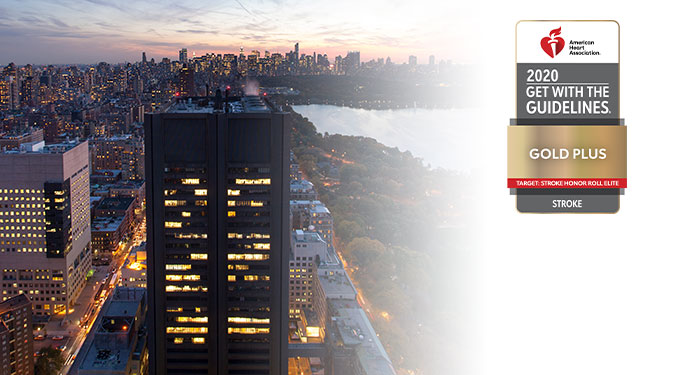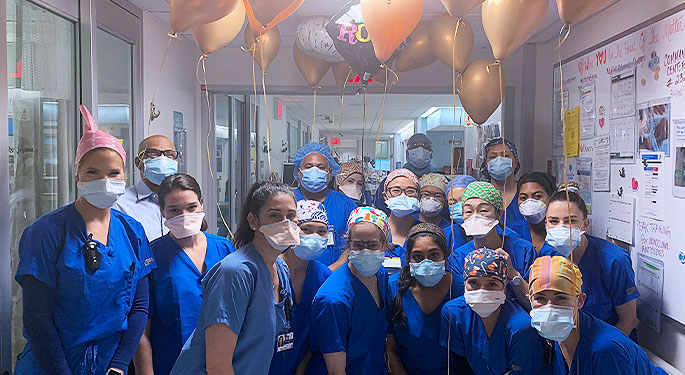
Leaders in Heart Care
Ranked among the top 20 in the nation for Cardiology & Heart Surgery by U.S. News & World Report® for 2023-24

New Unit with All Private Rooms and Advanced Monitoring Opens for Cardiology and Cardiac Surgery Patients
4 West is specially designed to provide high quality care in an atmosphere conducive to recovery.

Heart Patient Turns to Mount Sinai Morningside for “Bloodless” Surgery That Honors His Beliefs
Rolando Perez recovered quickly from a complex triple bypass surgery performed by John Puskas, MD and Omar Lattouf, MD, PhD.

Staten Island Grandmother Undergoes Rare Heart Surgery at Mount Sinai—And Recovers for Mother’s Day
Aortic surgeons at Mount Sinai Fuster Heart Hospital proceed with minimally invasive method to treat life-threatening aortic aneurysm

Stroke Survivor Shares His Message: Do Not Put Your Health on Hold
Successful open-heart surgery performed at Mount Sinai Morningside by Omar Lattouf, MD, PhD averts a catastrophic event
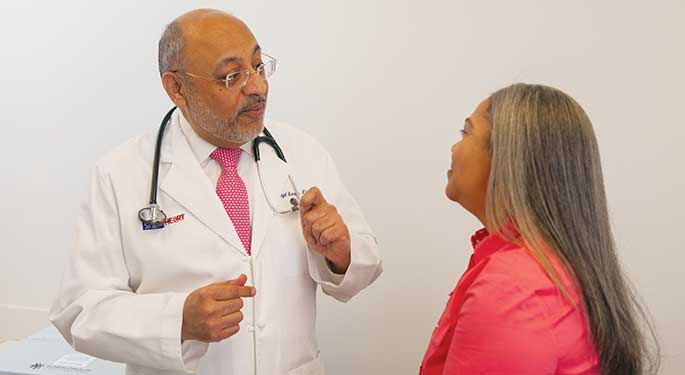
Jagat Narula, MD, Chair of the Department of Cardiology at Mount Sinai Morningside and patient
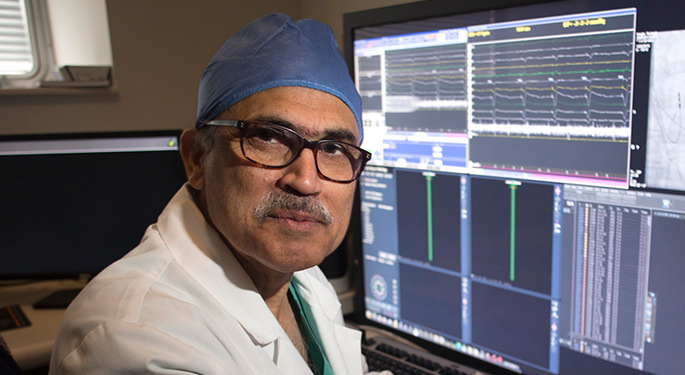
Davendra Mehta, MD, in the Al-Sabah Arrhythmia Institute
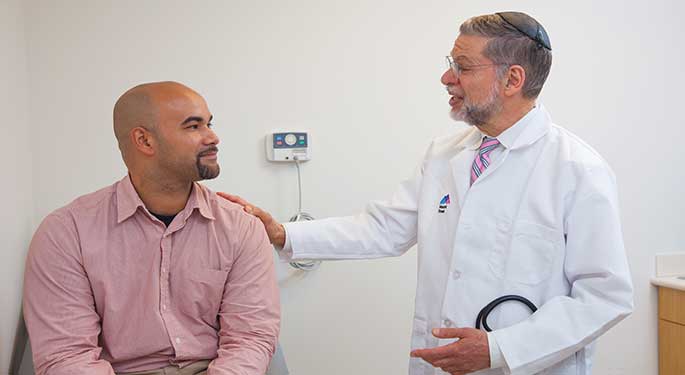
Alan Rozanski, MD, and patient
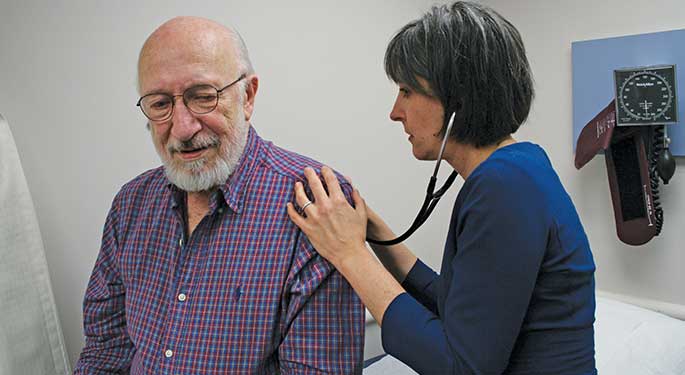
Jacqueline Tamis-Holland, MD, and patient
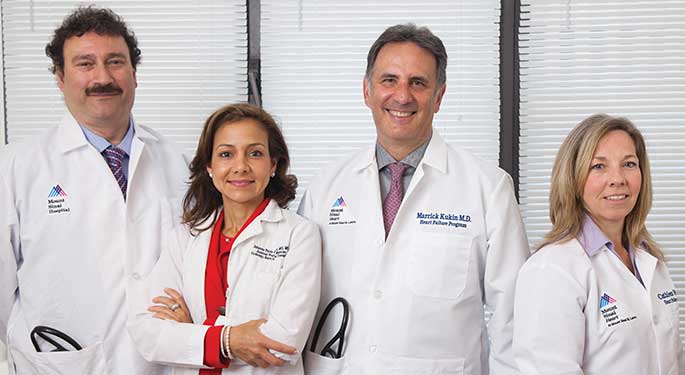
Mount Sinai Morningside Heart Failure Physicians
Mount Sinai Fuster Heart Hospital
At Mount Sinai Fuster Heart Hospital, we are always working to stay one step ahead of heart disease. Our comprehensive cardiology and cardiovascular surgery programs, at Mount Sinai Morningside and Mount Sinai West, ranked among the top 20 in the nation for Cardiology & Heart Surgery by U.S. News & World Report® for 2023-24, offer unrivaled diagnostics and curative measures designed to identify, treat, and prevent heart disease. We offer state of the art treatment and research in a warm and compassionate environment.
"Mount Sinai Fuster Heart Hospital: Where You’re the Heart of the Matter”
Mount Sinai Fuster Heart Hospital physicians and staff are experts in:
- Angina
- Arrhythmia or Heart Rhythm Disorders
- Heart Attacks and Coronary Artery Disease
- Heart Failure
- Heart Imaging
- Heart Valve Diseases
- Hypertension
- Hypertrophic Cardiomyopathy
- Nursing
- Peripheral Vascular Disease
- Preventative Cardiology
Heart Failure and Transplantation Program
The term “heart failure” sounds like your heart has stopped working. But that’s not what’s going on. Heart failure occurs when the heart is too weak or too stiff to pump enough blood to meet the body’s needs. This means the body might not get all the oxygen it needs, which could make it hard to breathe. While not curable, heart failure is generally treatable. At the Mount Sinai Fuster Heart Hospital Cardiovascular Center at Mount Sinai Morningside, we offer advanced care for heart failure to lengthen your life and help with symptoms.
Advanced Diagnostic Techniques
Typically, doctors diagnose heart failure using heart rhythm devices, cardiac magnetic resonance imaging, and echocardiography. But under the leadership of Sean P. Pinney, MD, Chief of Cardiology at Mount Sinai Morningside, our heart failure center offers the latest in diagnostic technologies. Our state-of-the-art approaches include:
- Positron emissions testing: This non-invasive imaging technique lets doctors assess blood flow to the heart muscle.
- Multimodality imaging: This scanner detects various forms of heart disease that fall under the category of infiltrative cardiomyopathy.
- Comprehensive exercise hemodynamic lab: This facility mimics patients exercising, which helps our doctors monitor changes in cardiovascular function.
- Remote monitoring devices: These tools let doctors know what is going on when you’re at home. Detecting changes early allows doctors to provide medical intervention and often prevents the need for hospitalization.
- Genetic testing: Our trained genetic counselors collect and analyze information about any changes (mutations) in your DNA. This gives our doctors important information about any inherited forms of heart disease.
Treatments We Offer
Mount Sinai Morningside’s approach to patient care is designed to prevent you having to go to the hospital, or having to go back to the hospital (called rehospitalization). We use a number of treatment approaches in this effort:
- Medication titration: Patients with heart failure regularly see a pharmacist or nurse practitioner in our Titration Assistance Clinic. These health care providers run test to make sure you are receiving the correct dosage of medication. Studies show that if patients receive higher doses of medication early, they have better outcomes.
- Remote monitoring devices: You may wear one of these devices at home. The monitoring devices have sensors that look for warning signs of fluid buildup which, without intervention, could require hospitalization. When your doctors can monitor you when you are at home, it keeps us up to date on your condition and gives you confidence that you are being closely monitored even when you are not in our offices.
In addition to these approaches, we use a variety of post-hospitalization follow-up techniques to improve outcomes. These include:
- Check-ups post-hospitalization: Approximately a week after being discharged from the hospital for congestive heart failure, you will return for a visit with a nurse practitioner (NP) specializing in heart failure. The NP will examine you using a remote dielectric sensing device, which can tell whether you are congested. If there is fluid buildup in the lungs, the NP will adjust your medication.
- Injectable furosemide: This medication is injected under the skin and is the equivalent of an intravenous infusion. We give an auto-injector to you at discharge so you can use it at home. This way, if you start feeling congested and might otherwise consider returning to the hospital, you can administer one dose at home. This may prevent the need for re-hospitalization.
Clinical Trials
Patients at Mount Sinai Morningside have access to a wide range of clinical trials that employ cutting-edge devices to detect and treat congestive heart failure. These clinical trials represent the next generation of treatment for heart failure. They have demonstrated effectiveness in enabling patients to live fuller and longer lives. Some of the clinical trials currently underway include:
- Treatment of cardiac amyloidosis and sarcoidosis: We make it a priority to diagnose and treat these diseases. With cardiac amyloidosis, the body overproduces a protein that causes the heart to stiffen and eventually fail. Researchers estimate that 6 percent of Black people living in New York carry the gene that cause amyloidosis. Sarcoidosis can cause pulmonary disease, heart disease, and heart arrhythmias. It also tends to affect the Black population. Both of these conditions are treatable—if we detect them. We are undertaking clinical trials to diagnose and treat these conditions with more effective medications.
- Aquapheresis: This in-hospital treatment removes fluid from patients who are volume overloaded because of worsening heart failure. We are exploring whether it is helpful for our patients with heart failure.
- Micro axial flow pump: This device is used to treat patients with worsening heart failure and resulting kidney failure. The clinical trial will help us determine how useful it is.
Why Mount Sinai
Mount Sinai Morningside offers state-of-the-art techniques and devices—and highly trained and experienced health care providers. “We look forward to continuing to advance our cardiovascular center of excellence at Mount Sinai Morningside, serving the local communities of Upper Manhattan,” says Dr. Pinney. “As we focus on eliminating health care disparities, we are striving to create the top cardiovascular fellowship training program in New York and sustain a robust clinical trial program while employing the highest percentage of women and underrepresented minorities.”
Al-Sabah Arrhythmia Institute
The Al-Sabah Arrhythmia Institute at Mount Sinai Morningside is a state-of-the-art electrophysiology facility that provides the most advanced, comprehensive, and compassionate arrhythmia care. We treat a wide variety of heart rhythm disorders including atrial fibrillation, bradycardia (slow heart rhythms), tachycardia (fast heart rhythms), long QT syndrome, Brugada syndrome, and cardiomyopathies. We perform a wide range of treatments and have a contemporary computer controlled robotic navigation system, which makes procedures much quicker and safer.
Our Services include:
- Diagnostic studies to determine the exact origin of an abnormal heart rhythm
- Catheter ablation of arrhythmias
- Device implantations including pacemakers, defibrillators, and Watchman devices
- Tilt Table Testing to investigate syncope or fainting
- Cardioversion to restore normal heart rhythms
Center for Clinical Cardiovascular Care at Mount Sinai Fuster Heart Hospital
Mount Sinai Fuster Heart Hospital has opened an outpatient cardiovascular office at Mount Sinai Morningside. Our outpatient services at the Center for Clinical Cardiovascular Care at Mount Sinai Fuster Heart Hospital include:
- Preventative Cardiology
- Cardiac Surgery
- Heart Attack and Coronary Artery Disease
- Heart Failure
- Heart Imaging
- Vascular Medicine and Surgery
Cardiac Catheterization Laboratory
Mount Sinai Morningside Cardiac Catheterization Laboratory is staffed by a multidisciplinary interventional cardiology team offering individualized patient care from diagnosis through treatment and recovery, with a seamless integrated care pathway.
Cath Lab services include:
- Diagnostic cardiac catheterization
- Coronary revascularization including balloon angioplasty, stents, athrectomy
- Acute myocardial infraction management
- Peripheral angiography and percutaneous treatment of the arteries of the leg
- Balloon valvuloplasty
- Transcatheter Aortic Valve Replacement (TAVR)
Cardiology Amyloid Clinic
Amyloidosis is a disease that occurs when proteins break down into a substance known as amyloid which builds up in tissues and organs and interferes with their function. Deposits of amyloid in the heart cause the disease known as cardiac amyloidosis. As the deposits increase, the heart gets increasingly stiff and the pumping function gets weaker. There are several types of amyloidosis which are derived from different proteins. It is extremely important to determine the specific type of amyloid causing the disease, because each type of amyloidosis progresses at a different rate, and the treatment differs greatly for each form. Amyloid can affect many organs of the body simultaneously, and the cardiology amyloidosis specialist will work with other specialists as needed. Some forms of cardiac amyloidosis are hereditary, and Mount Sinai Fuster Heart Hospital offers cardiovascular genetics testing and counseling for patients with this form of amyloidosis.
